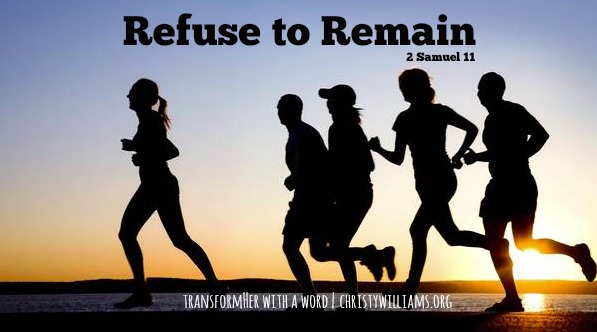Refuse to Remain
Whether it’s the result of a physical aliment like paralysis, the nature of one’s occupation like that of a truck driver, or a choice of habit to not get up and move about throughout the day, physical inactivity can lead to serious health concerns. Here is one reason why: the longer the body remains inactive, the more apt blood flow is to slow down. As blood flow slows down, the blood itself is able to pool and thicken. This increases the risk of clot formation which may cause a heart attack or a stroke. Bottom line: the body is designed to move.
David must have received this memo. Chapter 10 of Second Samuel closes with passages detailing David’s commitment to move. Here we read passages stating that he “gathered all Israel . . .,” “crossed the Jordan . . .,” “went to Helam . . .,” and “struck down Shobak . . .” These action words—gathered, crossed, went, struck down—sum up the moves that lead to David’s great victory over the Syrian army.
Sadly, however, these words also create a striking contrast with one word that communicates the inaction that led to David’s sinful spiral.
Yes, we go from reading about David gathering, crossing, going, striking down, to finding out that the entire Israelite army was later sent out to war, “But David remained . . .”
What? Remained? Not the “gathering, crossing, going, striking down. . .,” not the moving David!
Yes, that David. He remained.
There you have it: inactivity, the start of the pooling and thickening of David’s temptations.
When he should have been in the fields with his army, fighting the Lord’s battles, he instead “remained.” Just as physical inactivity sets the stage for serious complications in our bodies, this decision to “remain” set the stage for some serious complications in David’s life.
Had David been at his post, leading his army, he would have been out of the way of the temptation he later faced with Bathsheba. The same is true for us. When we neglect our business by choosing to “remain” rather than keep moving, the idleness this facilitates is a breeding ground for yielding to temptations. The thoughts and actions we struggle with are able to pool and thicken their plot to take us captive. This, in turn, increases the risk of giving in. Once we give in, this can cause an attack on our lives, our character, and our witness for Christ.
After David’s decision to remain in Jerusalem came his adulterous affair with Bathsheba followed by the murder of her husband Uriah. God was so displeased with David’s actions that, while He forgave him and spared his life, the life of the baby conceived was taken. Furthermore, after David’s daughter Tamar is raped by his son Amnon, David gets angry, but does not bring about justice. Perhaps he felt that due to his own sexual sin, he was in no position to punish the sexual sins of another. Now Absalom, David’s other son, gets furious and vengeful and decides for himself to have Amnon killed in cold blood for what he did to Tamar. After this Absalom flees from Jerusalem and goes four years without seeing his father’s face. Eventually, Absalom is also killed.
All of this started with David’s decision to remain.
When David was moving—gathering all of Israel, crossing the Jordan, going to Helam, and striking down the commander of Syria’s army—he was fulfilling his role as the King of Israel. He was doing what God had called him to do. He was not passively observing as others moved along. He was, himself, actively engaged.
Let’s learn from David’s mistake and be encouraged by God’s grace. Let’s fulfill our role as children of the King by doing what God has called us to do: declare His praises. Let’s not passively observe as others move along. Let’s stay actively engaged by daily reading our Bibles, worshipping our Lord, loving our neighbors, and fellowshipping with other believers.
Let’s move.
. . . And keep moving.
Refuse to remain!
____________________________________________________________
*SSS: Spending the Summer In Samuel
- Reading Assignment for Week #12 (August 11th – August 16th): 2 Samuel 16-20
- Week 12 Journal Questions for 2 Samuel 16-20
- 1 & 2 Samuel Outline

